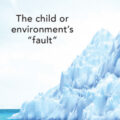
Connecting emotionally to your child is the most important parenting skill. This means listening, being present, focusing, and looking for the needs underlying your child’s behaviors. Marshall Rosenberg, developer of Non-Violent Communication, says our behaviors are the best strategies we can think of at the time to get our needs met. When we look at our kids’ behaviors through this lens, then instead of reacting to their behaviors (traditionally done with rewards and punishment), we look for their unmet needs, help them meet them, and then no longer see those behaviors. As we do this, we help them learn more effective strategies (think new behaviors) to get their needs met.
I’m currently reading Respectful Parents, Respectful Kids: 7 Keys to Turn Family Conflict Into Cooperation by Sura Hart and Victoria Kindle Hodson. This gem of a book goes beyond quick-fix parenting and discipline techniques to provide a foundation of communication and relationship skills. The authors teach us how to accomplish this with practical, simple, life-changing exercises.
This is how it’s described on Amazon.com:
“More than a tool to correct bad behavior, this handbook urges parents to move beyond typical discipline techniques by creating an environment based on mutual respect, emotional safety, and positive, open communication. The seven outlined principles redefine the parent-dominated family by teaching parents how to achieve mutual parent/child respect without being submissive, set firm limits without using demands or coercion, and empower children to open up, cooperate, and realize their own innate potential. Based on Marshall Rosenberg’s Nonviolent Communication process, the framework helps parents break down the barriers to outstanding relationships with their kids by avoiding destructive language and habits that keep parents and children from understanding one another. Activities, stories, and resources help parents immediately apply the seven keys to any parenting situation.”
I recommend this book to any parent who wants to create deeper and more meaningful connections with their children.
